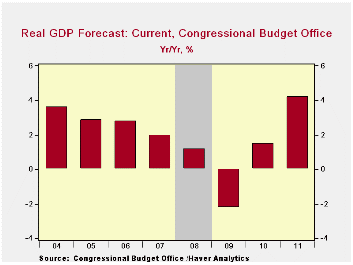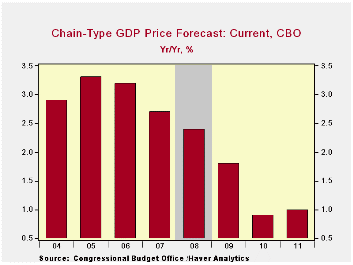 Global| Jan 23 2009
Global| Jan 23 2009Consensus Forecast for 4Q GDP: Activity Down 5%
by:Tom Moeller
|in:Economy in Brief
Summary
The 4Q 08 figures for Gross National Product will be available next Friday at 8:30 A.M. As always, the data will be a key gauge for measuring the current shape of the economy. And the news is not likely to be pleasant reading. It's [...]

The 4Q 08 figures for Gross National Product will be available next Friday at 8:30 A.M. As always, the data will be a key gauge for measuring the current shape of the economy. And the news is not likely to be pleasant reading. It's easy to now generate an estimate that economic activity fell at a 5.1% annual rate last quarter, which indeed is the current Consensus forecast. The range of forecasts extends, however, from -2.0% to -7.5%.
By itself, the magnitude of the drop expected by Consensus would be the fastest since the middle of the 1981-82 recession. Peak-to-trough activity declined during that recession by 2.9% reflecting a pattern of sharp decline early, then nine months of stagnation. This time no such pattern is foreseen by Consensus estimates. Another sharp drop in GDP is expected for this quarter, 1Q09, then a slight decline in 2Q. A downturn following that pattern would make it severe and the harshest since the end of WWII.The Recession in Perspective from the Federal Reserve Bank of Minneapolis can be found here.
The table below contains a set of estimates for the 4Q GDP components, generated mostly from the monthly data that already is available. As might be expected, consumer spending and housing lead the downturn. Developing estimates for the worst case outcome of a 7.5% decline in activity is relatively easy by just changing the expectation for consumer spending to -8.0%, perhaps due to weaker vehicle sales, and eliminating the addition from an improved trade deficit.
General expectations are for a subpar, 2H recovery with quarterly gains of 1.0% to 2.0%. Persistent declines in consumer spending coupled with further weakness in housing would easily unravel those expectations. Moreover, lagged declines in business investment and weaker exports due to recessions abroad could add to any lack of forward economic momentum. However, there is the potential for some upside. Pent-up demand for consumer durables could be unleashed with the huge amount of monetary stimulus already in place and an easing of tight credit conditions.
In this era of recession and weak growth, price inflation seems not to be an issue. Growth in the GDP chain prices is expected to drop to 1.0% by 2010 where it is expected to remain in 2011.
| U.S. GDP Components (%, AR) | 4Q (Estimate) | GDP Weight | 3Q | 2007 | 2006 | 2005 |
|---|---|---|---|---|---|---|
| GDP | -5.1 | -0.5 | 2.0 | 2.8 | 2.9 | |
| Personal Consumption Expenditures | -6.0 | .70 | -3.8 | 2.8 | 3.0 | 3.0 |
| Residential Investment | -20.0 | .03 | -16.1 | -17.9 | -7.1 | 6.3 |
| Business Investment | -15.0 | .12 | -1.7 | 4.9 | 7.5 | 7.2 |
| Government Spending | 3.0 | .17 | 5.8 | 2.1 | 1.7 | 0.4 |
| Inventories (Contribution to GDP Growth) | 0.0 | -- | 0.8 | -0.4 | -0.0 | -0.1 |
| Net Exports (Contribution to GDP Growth) | 1.0 | -- | 1.1 | 0.6 | -0.0 | -0.2 |
Tom Moeller
AuthorMore in Author Profile »Prior to joining Haver Analytics in 2000, Mr. Moeller worked as the Economist at Chancellor Capital Management from 1985 to 1999. There, he developed comprehensive economic forecasts and interpreted economic data for equity and fixed income portfolio managers. Also at Chancellor, Mr. Moeller worked as an equity analyst and was responsible for researching and rating companies in the economically sensitive automobile and housing industries for investment in Chancellor’s equity portfolio. Prior to joining Chancellor, Mr. Moeller was an Economist at Citibank from 1979 to 1984. He also analyzed pricing behavior in the metals industry for the Council on Wage and Price Stability in Washington, D.C. In 1999, Mr. Moeller received the award for most accurate forecast from the Forecasters' Club of New York. From 1990 to 1992 he was President of the New York Association for Business Economists. Mr. Moeller earned an M.B.A. in Finance from Fordham University, where he graduated in 1987. He holds a Bachelor of Arts in Economics from George Washington University.
More Economy in Brief
 Global| Feb 05 2026
Global| Feb 05 2026Charts of the Week: Balanced Policy, Resilient Data and AI Narratives
by:Andrew Cates






